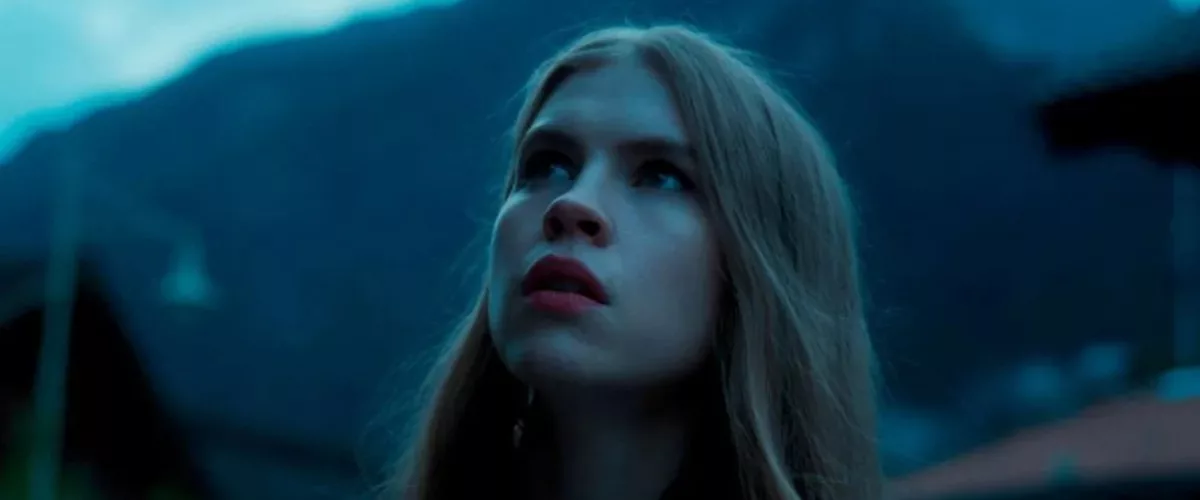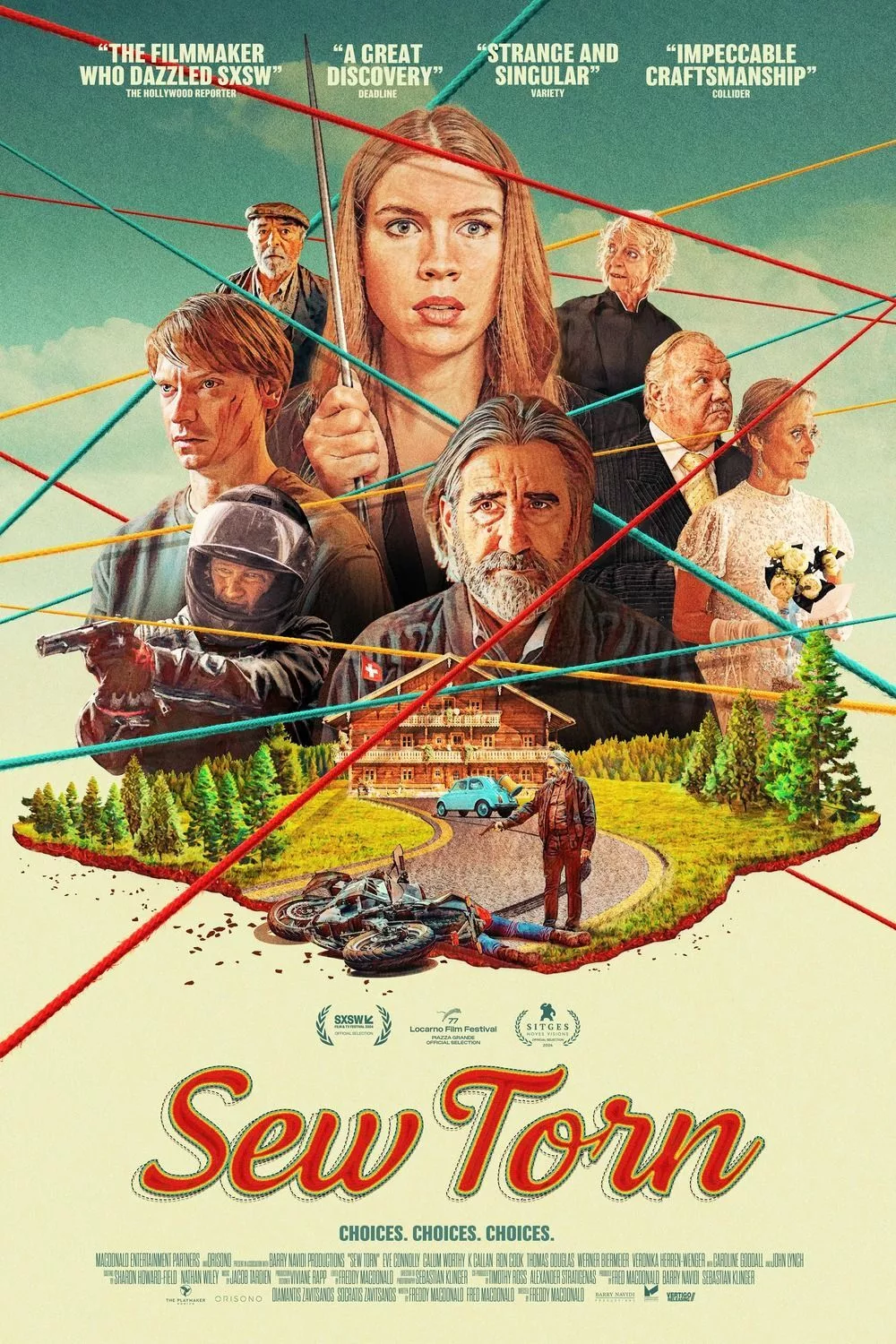Freddy MacDonald’s “Sew Torn” started as a short film. A young “mobile seamstress” (Dagna Litzenberger-Vinet) uses her uncanny skills with thread to capitalize on a drug deal gone awry. Until the last second of its 6 minute length, you have no idea what her plan is, what she could possibly be doing, unspooling that thread around the crime scene. Taut and stylish, with a whimsical sense of humor, “Sew Torn” exists on very familiar genre ground, but MacDonald approaches it from the side. In expanding the short into a feature, MacDonald retained the feel of the original, for the most part, although the sense of surprise is lost in repetition. Most intriguingly, he does interesting things with narrative, fracturing and bending it, keeping everything at a slight remove—a strength, in this case. “Sew Torn” isn’t a genre exercise, not really. It’s more of an off-kilter riff on the familiar.
Barbara Duggen (Eve Connolly) is the seamstress, living in a small Swiss village, running the business she inherited from her dead mother. Barbara’s grief is still fresh. She has unspooled colored thread throughout her house, creating a net suspended from the ceiling, punctuated by pictures of her mother. Dangling threads can be pulled, activating a voice recording of her mother when alive. The house is both shrine and a booby-trapped grief-feedback-loop. Barbara has only two clients. Oskar (Ron Cook) has commissioned a quilt in tribute to his wife, each square featuring a different shared memory and sound component. (Barbara specializes in talking portraits.) Grace Vessler (Caroline Goodall) demands Barbara come sew a button on her wedding dress. Grace spends the entire session berating a cringingly submissive Barbara for being nothing like her mother.
It is on her way home from the upsetting session with Grace, that Barbara comes across the drug-deal-derailed. She slowly rolls past the scene in her tiny car, with its massive spool of yellow thread attached to the trunk. She stares out at the crashed motorcycle and the two injured men sprawled on the road, one holding onto the feet of the other. She makes eye contact with both men. A locked briefcase appears to be the object of the men’s struggle, so she—inexplicably—decides to beat these two at their own game. She must neutralize them first, so she can take off with the goods, whatever the goods may be.
Why would Barbara, a sad woman who barely speaks above a whisper, make such a reckless choice?
MacDonald has added a voiceover element, where Barbara muses the very same thing. “Choices … choices …”
Barbara’s voiceover is, thankfully, used sparingly, and more as a scaffold on which to hang the story’s triptych structure. She announces the three chapters to follow: “Perfect Crime. Call Police. Drive Away.” These are the three choices presented to her at the crime scene in progress, and we see each one play out, “Run Lola Run” style. The “perfect crime” we see first, although as we all should know by now, there is no such thing as a perfect crime. Each chapter ends in what appears to be disaster, suggesting that no matter which path Barbara chooses, it will all end the same way. Oskar and Grace show up in each chapter, as do the two men in a death-grip on the pavement: the young Joshua Armitage (Calum Worthy) and the older Beck (Thomas Douglas). Joshua fouled up what was supposed to be a standard drug drop, and his father—a kingpin named Hudson Armitage (John Lynch)—is on his way and out for blood. The elderly town sheriff (K Callan) appears in two of the chapters, trying to manage the crime scene while also officiating Grace’s wedding. John Lynch is the impending threat in each chapter, the wild card element who will wreak havoc on the town if Barbara can’t manage to use her seamstress skills to thwart the murder spree.
Each chapter is its own stand-alone short. Nothing accumulates, it’s not that kind of story. Barbara’s seamstress skills aren’t really in the “sewing” part of the equation. She is a knot-maker and pulley expert, creating intricate webs of threads and loose loops, to create makeshift lassos, to grab keys, or pull guns out of the way, or reach electrical outlets. In each scenario, she is the expert escape artist. Thread is invisible if you’re not looking for it. Turn your back for five minutes, and she’s rigged an entire restaurant in Gordian knot fashion.
Connolly’s Barbara is a fascinating central character, even though she probably has about twenty spoken words of dialogue. Barbara is shy and unhappy. She has “twee” qualities written all over her. But listen to the visceral grunts Connolly makes when dragging Beck’s injured body up the stairs, using an intricate pulley system she’s rigged up with ropes. Connolly puts real muscle into her performance, creating a sense of emotional urgency.
The short film works better, as shorts often do. The shock of surprise leaves you wanting more, and it doesn’t wear out its welcome. The feature provides “more,” and the repetition dissipates some of the tension. However, MacDonald creates a fun and inventive mood, because Barbara is always ahead of the audience. Unless you’re an expert knot-maker and pulley-creator, you will have no idea what her overall plan is in each scenario. Watching her work it out, all as the clock ticks towards disaster, leads to the pleasure of seeing her outrageous plan unfurl successfully.
It’s fun when you’re shown something you’ve never seen before. You have seen derailed drug deals, you have seen innocent bystanders get roped into dangerous situations, and you have seen more than your fair share of shy unhappy women rising to the occasion. But you haven’t seen a woman trip up a dangerous foe by secretly weaving colored threads around shoe laces, belt buckles, chair legs, a gun trigger, all while dancing wildly around the room to disguise her true intentions.
“Sew Torn” marks an auspicious debut for MacDonald.




















